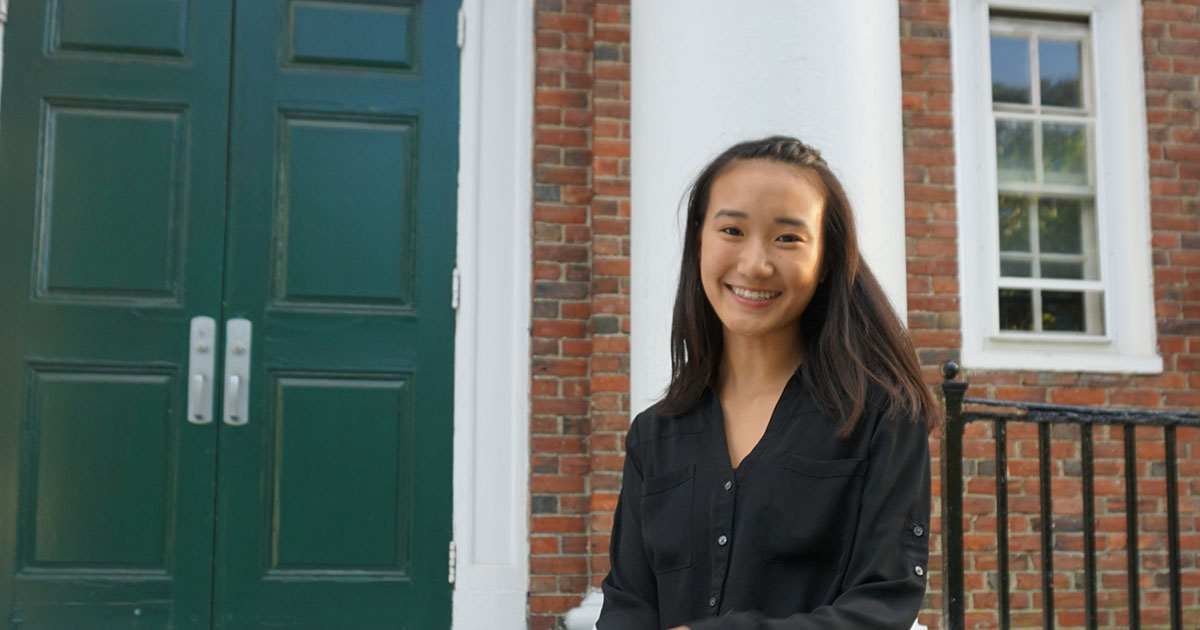Students Show Leadership in Civic, and Civil, Engagement

Civic engagement means “listening to others’ experiences, recognizing areas for improvement, and using your voice,” said Serena Chang ’23, vice president of communications for the Babson Political Association (BPA).
Chang and her team demonstrate to other students the importance of shifting their mindset from “someone else is going to handle it,” to “my inputs and my thoughts matter. I have a voice and I need to use it.”
“The BPA,” Chang says, “is a group of students from a wide range of political backgrounds and nationalities who come together to talk about politics and current events in a friendly and open way, and to discuss the impact it has on our lives.”
Chang—also a vice president of scholarship and awards in Babson’s professional fraternity Delta Sigma Pi and a member of the Babson Yoga Club—is reserved and humble when discussing her role within these organizations. But, she’s also extremely respectable, articulate, and a model leader when it comes to speaking about her responsibilities in promoting civic engagement and civil discourse.
“Our number one rule is to challenge the idea, not the person,” Chang said.
Like-Minded, in a Way
In a message to the Babson community earlier this month, President Stephen Spinelli Jr. MBA’92, PhD wrote, “Politics illicit strong and passionate opinions, but our standards for discourse—both in person and online—remain constant. … Passionate opinions are more powerful and resonant when coupled with respect.”
“It’s very intimidating to talk politics,” Chang said. “Our goal is to create a welcoming environment where people can come, learn about current events, and have engaging discussions without feeling like their ideas or experiences will be discounted.”
This group, as Chang describes it, is for like-minded students but not in any political sense. “Like-minded in a way that we want to have respectful and productive discussions while referencing valid and reputable news sources,” she said.
As Babson College students, taught early and often to be active and entrepreneurial problem-solvers, BPA members see civil discourse as a means to be productive. “It’s about using logic and critical thinking while dissecting current events, talking with others, and trying to understand where they’re coming from, not from a place of anger or hurt, but from a shared sense of wanting to create productive discourse,” Chang said.
This month, the College, its Office of Multicultural and Identity Programs, Glavin Office of International Education, Student Life, and others have come together to offer community-wide opportunities to further their education in the political landscape, including sessions such as “Civic Engagement Keynote: Do’s and Don’ts of Dialogues Across Difference,” and “Circles of Diverse Political Perspectives.”
“Human beings are incredibly complex, as are current societal and political issues, yet we often reduce our perception of others based on one statement, viewpoint, or tweet. As a result, we tend to disengage and avoid talking about difficult topics,” said Abigail Freeman, director of community standards. “At Babson, we view engaging in civil discourse as a requirement for any successful entrepreneur and a skill worth developing with intentionality. Strengthening this skill requires us to practice communicating with those who hold a different perspective openly and without judgment.”
Civil Discourse and Social Media
When it comes to social media, Chang and BPA advise students to always take pause.
“Know where your news is coming from. Know the voice from which you’re hearing this news,” Chang said. “It’s important to first understand (what you’re reading, seeing, or hearing), and also to qualify it and them.”
It’s similar, she said, to how BPA handles its events. “We always have a moderator to make sure that people are talking to each other and not at each other. We encourage people to go into more interesting lines of thought, but prevent discussions from going in circles.
“It’s unrealistic to be knowledgeable about everything all of the time. When you read or hear someone saying something that you were previously unaware of or find to be questionable,” Chang added, “ask them to provide a news source. Note that you’d like to learn more about it, and offer to work collectively to get to the bottom of it.”
From Political to Personal and Professional Growth
“I’ve stayed a part of this group because of the people. Everyone in BPA is welcoming and engaged with each other. We all come from varying political backgrounds, but we’re able to sit down and actually talk to each other,” Chang said. “We might not agree with each other, but we can talk about why America is in such a polarizing political state right now, and we can take action, whether that be in the form of voting, facilitating discussion, or bringing attention to current events,” shared Chang.
“What I’m learning most from this experience is how to listen more, how to moderate discussions, and how to get on more of a common ground with people who you might not have expected to.”
Posted in Entrepreneurial Leadership





